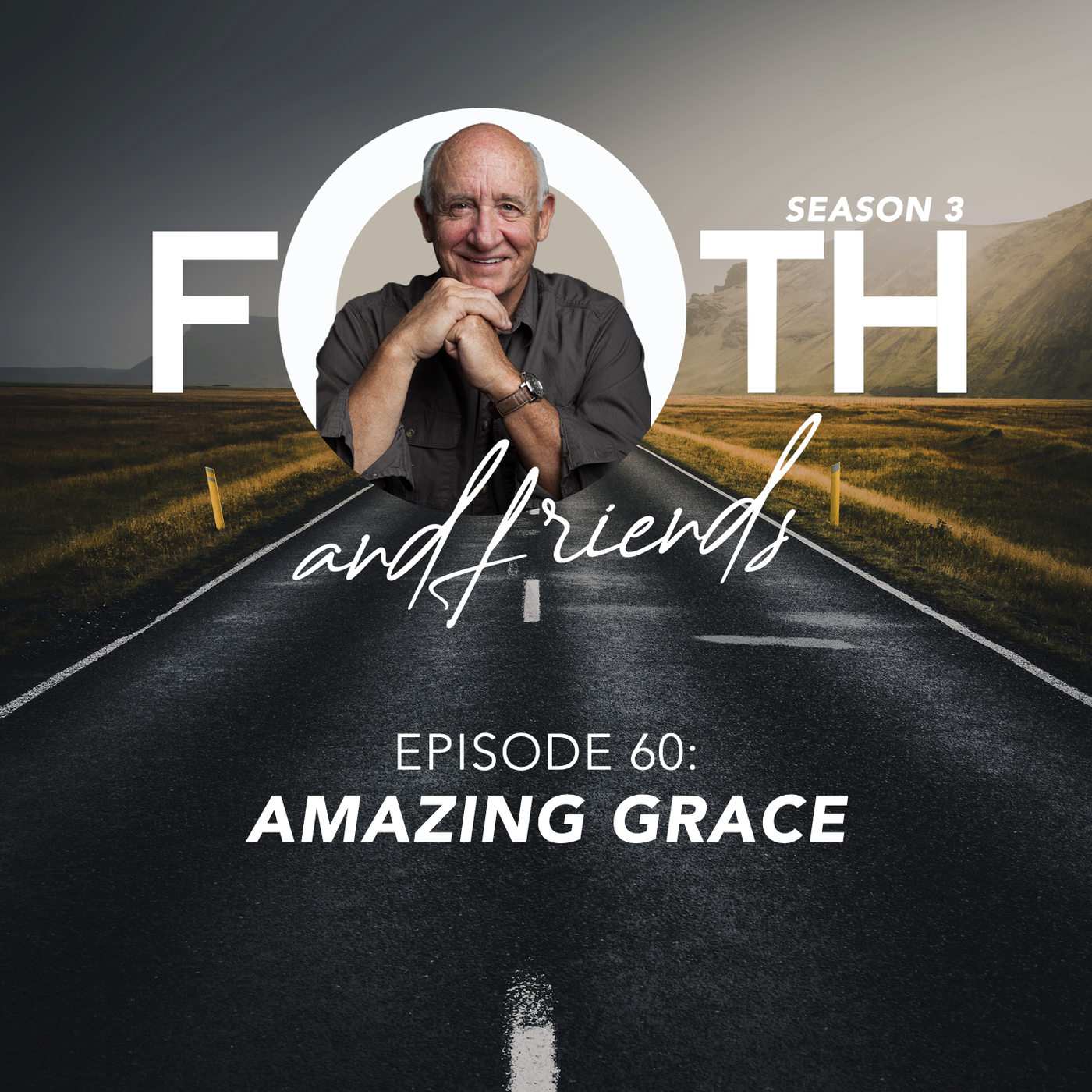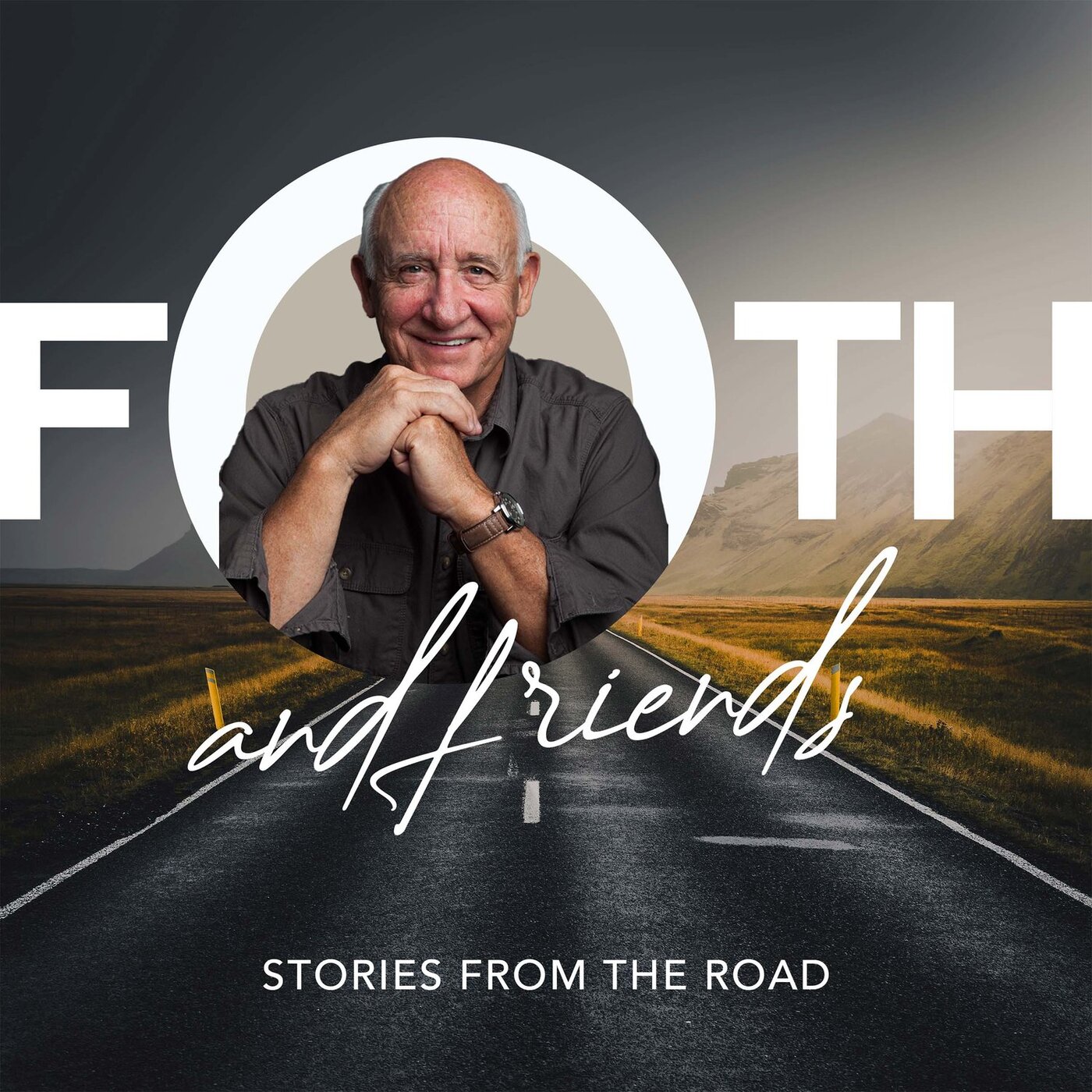00:17.380-00:19.960Amazing Grace00:20.420-00:29.940How sweet the sound that saved a wretch like me00:31.780-00:39.280I once was lost, but now I'm found00:39.960-00:45.540Was blind, but now I see00:47.219-00:51.620Hello again. This is Dick Foth with Stories from the Road.00:52.760-00:54.620And I have a story for you this time.00:55.600-00:59.100I think I have stories all the time, but this is a good one.01:00.560-01:05.180Her name was Elizabeth, and she lived with her husband in London,01:05.960-01:11.960Wapping is a community in the Docklands, down where merchant ships would come in.01:12.240-01:15.060It's in what they call the East End of London.01:15.400-01:17.080East Enders, working class people.01:18.160-01:27.680And it was there on this day, July 24th, 1725, that she had a baby boy.01:28.640-01:29.540His name was John.01:31.060-01:34.460And John was the apple of her eye.01:35.340-01:36.660She was a religious person.01:36.970-01:39.040She was a person of faith, Elizabeth was.01:39.680-01:45.560Her husband was a seafaring merchant and pretty much an irreligious man.01:46.940-01:55.060But for seven years, she brought up John, her boy, to know scriptures.01:55.660-02:00.400She, from a denominational background, she was what they call a congregationalist.02:02.320-02:09.479and steeped in scripture and she would teach him scriptures and teach him songs and expose him to02:09.660-02:16.800hymn writers of the day like a fellow named Isaac Watts and little John apparently liked all that02:17.240-02:25.200so he was at his mother's knee for seven years and then she suddenly died and he was bereft02:27.440-02:34.640But that information and that formation of his mother in those first seven years was imprinted deep in him.02:36.200-02:39.640Let me just put a parenthesis here and say this.02:40.180-02:46.740From a child development point of view, the first seven years of a child's life in terms of brain development is critical.02:47.220-02:50.500By the age of two, you have 80% of your adult brain.02:51.220-03:00.639In that next five years, when you're learning language and you have social development and logical thinking and all of that, you gain 15%.03:01.180-03:08.740So by the time you're seven years old, you have essentially 95% of your brain.03:09.280-03:12.660You don't get the full 100% until you're 25.03:14.000-03:16.480So those first views are really critical.03:16.920-03:20.580Well, when his mom died, John was in the care of his father.03:20.860-03:23.380His father quickly remarried, had several other children.03:24.280-03:27.140And when he was 11, his father took him to sea.03:28.180-03:31.220And so he spent his teen years, his early teen years particularly,03:32.160-03:35.280with his father on merchant ships in very difficult circumstances.03:35.880-03:38.700His father was a very strict disciplinarian.03:39.540-03:43.620But in his teenage years, through a series of circumstances that I won't go into here,03:45.760-03:48.600was in a very debauched state.03:49.330-03:51.620Even though he had these early seven years03:51.960-03:55.560with this spiritual upbringing and influences in his life,03:56.080-04:00.140the testings of the teenage years were a lot for him.04:00.220-04:03.940He ended up being caught by an impressment gang.04:04.350-04:06.540The British Navy used to have gangs that would go out04:06.540-04:08.740and just grab young men with seafaring background04:09.440-04:11.420and put them in the Navy, and he did that.04:11.470-04:14.960But he was the most rebellious, anti-authoritarian.04:15.160-04:17.640He would make up bawdy songs about the captains.04:18.100-04:20.120He would be flogged and all of that.04:20.700-04:27.920And one day, he ended up begging to be put on a merchant ship that happened to be in the slave trade.04:28.600-04:33.320Long story short, he ended up going to Africa, being in the slave trade for some time.04:34.180-04:43.700But also, he was sold to an African empress on a place called Plantation Island off Sierra Leone in the hump of Africa.04:44.420-04:46.120And it was a terrible time for him.04:46.860-04:49.500And he almost died there, severe health issues.04:49.680-04:50.840He became a slave himself.04:51.780-04:55.340And he was able to write some letters, and one of them got to his father,04:55.520-04:56.560even though they weren't close.04:57.020-05:01.800His father sent a friend, was captain of a ship by the name of the Greyhound,05:02.440-05:05.720and found him and brought him back to England.05:05.840-05:09.640And they were caught in a storm when John was 23.05:10.340-05:13.540So we're going from age 7 to age 23.05:13.860-05:17.440You're going from 1725 to 1748.05:18.280-05:22.900And those years after seven were just horrific years for him,05:23.500-05:27.840both in terms of the impact and his own infidelity as a person.05:27.880-05:30.380He was a debauched young man.05:38.480-05:40.140But in a storm on the Irish Sea,05:42.020-05:43.500when the ship was coming apart,05:44.440-05:50.060he came to an initial statement of faith when he called out, Lord, have mercy on him.05:50.220-05:54.640Those of you who know this story have by now guessed that it was John Newton.05:55.580-06:00.120And John Newton, although a miserable outcast, as someone has said,06:01.220-06:07.000found himself later becoming captain of a ship, a slave ship, actually.06:07.860-06:15.740And it's this fascinating thing where they separated out what they were doing in the trade from one's personal life.06:15.840-06:25.020And as he started growing in his own faith, he became what is called a well-paid surveyor of tides in Liverpool when his health didn't hold up for him to be at sea anymore.06:26.240-06:28.420And later on, he felt like he was called to ministry.06:29.300-06:37.400And he became an Anglican pastor, first in a small congregation in a town called Olney.06:37.840-06:39.040and later in London.06:39.940-06:42.600And he did that for 43 years of his life.06:43.180-06:47.020He had married the girl of his dreams when he was 2406:47.400-06:49.120after his experience on the Irish Sea06:49.960-06:53.940and became a devoted husband to his wife Mary for 40 years06:54.700-06:56.420until she died in 1790.06:57.580-07:00.260He was a personal friend to William Wilberforce07:00.320-07:02.820who championed the abolishment of the slave trade07:03.200-07:04.200and also slavery.07:05.020-07:07.400He became a friend to William Carey07:07.420-07:09.420sort of considered the father of modern missions,07:09.690-07:11.640John Wesley, the great evangelist,07:11.670-07:13.580George Whitefield, the great evangelist.07:14.180-07:17.100And finally, in his years as a pastor,07:17.150-07:21.220he started writing poems that often then had hymns,07:22.280-07:24.360lyrics that had melodies put to them.07:24.880-07:27.360And he is, as you know, most of you would know,07:27.620-07:30.020the author of the song Amazing Grace.07:31.100-07:33.620He died on December 21st, 1807.07:33.880-07:40.280And in 1807 was the year that the slave trade was abolished in Great Britain.07:42.560-07:47.580He's famous for that, for one song called Amazing Grace.07:48.160-07:52.380Amazing Grace for us, especially after the tragedies of 9-11,07:53.400-07:58.320where bagpipes played that song at so many memorial and funeral services.07:59.000-08:02.240It's almost like a second national anthem here in the United States.08:04.300-08:12.960but the idea of grace is a theme in john newton's life that just pervades what he wrote what he08:13.180-08:21.240talked about how he acted in his book phil yancey who authored what's so amazing about grace in his08:21.480-08:27.000book he says this about a movie called the last emperor the young child the last emperor china08:28.140-08:32.700anointed as the last emperor of China lives a magical life of luxury with a thousand eunuch08:32.919-08:39.340servants at his command. What happens when you do wrong his brother asks. When I do wrong someone08:39.530-08:46.280else is punished the boy emperor replies. To demonstrate he breaks a jar and one of the08:46.620-08:53.480servants is beaten. Jesus comes along and reverses that ancient pattern Yancey says08:54.320-08:59.020when the servants erred or did wrong, the king was punished.09:00.280-09:06.700Grace is free only because the giver himself has borne the cost.09:09.040-09:17.980This idea that Jesus loves me in a way that precedes however I love him back,09:18.000-09:22.060if I can put it that way, is captured again.09:22.240-09:26.520Yancey reflects on a story Brennan Manning, another author tells.09:26.820-09:30.020Brennan Manning himself is a former priest.09:30.580-09:34.800And he tells the story of an Irish priest who on a walking tour of a rural parish09:35.520-09:38.460sees an old peasant kneeling by the side of the road praying.09:39.400-09:40.520He was impressed by that.09:40.900-09:45.920And the priest says to the man, you must be very close to God.09:47.180-09:51.180The peasant looks up from his prayers, thinks a moment, and then smiles.09:52.200-09:56.500and says, yes, he's very fond of me.09:58.580-10:00.100I love that thought.10:00.920-10:03.360I love the idea that here is the God10:04.060-10:06.740who comes after us with his grace.10:08.360-10:10.880And he lays down the gauntlet of grace,10:11.280-10:14.960throws it down, if you will, and says, how about that?10:38.400-10:41.440Just to wrap this brief podcast up10:42.880-10:55.360It wasn't long ago that Bill Moyer's journalist, well known over the years for both his journalism and his faith journey, passed away.10:56.660-11:06.380And Bill Moyer's documentary film, again Yancey says, was on a hymn, Amazing Grace, and includes a scene filmed in Wembley Stadium in London.11:07.400-11:15.500Various musical groups had gathered together, rock bands had gathered together to celebrate some positive things that were going on in South Africa years ago.11:16.800-11:24.260And for some reason, they had asked Jesse Norman, African-American opera singer, to be the closing act.11:25.700-11:30.720And so these bands are just ramping things up, bands like Guns N' Roses.11:30.830-11:33.200Some of you would remember that band from years back.11:33.340-11:38.040They blasted the crowd through banks of speakers riling up fans, Yancey says,11:38.480-11:39.880already high on booze and dope.11:40.480-11:43.600The crowd yells for more curtain calls and the rock groups obliged.11:43.900-11:48.800Meanwhile, Jesse Norman sits in her dressing room discussing Amazing Grace with Moyers.11:49.580-11:52.980The hymn was written, of course, by John Newton, a coarse, cruel slave trader.11:53.880-11:57.320He first called out to God in the midst of a storm that nearly threw him overboard,11:58.080-12:02.139came to see the light only gradually, continuing to apply his trade12:02.160-12:07.660even after his conversion. He wrote the song, quote, how sweet the name of Jesus sounds, end quote,12:08.120-12:13.780while waiting in an African harbor for a shipment of slaves. It boggles one's mind to think about12:13.940-12:19.920that, except it shows how the grace of God works incrementally in our lives. Later, though, he12:20.060-12:23.980renounced his profession, became a minister, joined William Wilberforce in the fight against12:24.680-12:30.059slavery. John Newton never lost sight of the depths from which he had been lifted, never lost sight12:30.420-12:36.840of grace, even though in his later years he actually was blind. And when he wrote that12:37.040-12:44.240saved a wretch like me, he meant those words with all his heart. I love this part. In the film,12:44.480-12:49.100Jesse Norman tells Bill Moyers that Newton may have borrowed an old tune sung by the slaves12:49.300-12:56.079themselves, redeeming the song, just as he had been redeemed. And finally, the time comes for12:56.100-13:01.120her to sing. A single circle of light follows Norman, a majestic African-American woman,13:01.620-13:07.400wearing a flowing African dashiki as she strolls on stage. No backup and no musical instruments,13:07.760-13:13.620just Jesse. The crowd stirs, restless few recognize the opera diva. A voice yells for13:13.620-13:20.640more guns and roses. Others take up the cry. The scene is getting ugly. Alone, a cappella,13:21.680-13:24.420Jesse Norman begins to sing very slowly.13:26.020-13:31.600Amazing grace, how sweet the sound that saved a wretch like me.13:32.460-13:34.720I once was lost, but now am found.13:35.660-13:37.240Was blind, but now I see.13:38.360-13:41.180A remarkable thing happens in Wembley Stadium that night.13:41.270-13:45.100Several thousand raucous fans fall silent before her aria of grace.13:45.960-13:47.880By the time Norman reaches the second verse,13:47.890-13:49.940t'was grace that taught my heart to fear.13:50.640-13:52.600And grace, my fear's relieved.13:53.480-13:55.400Soprano has the crowd in her hands.13:55.520-13:57.440By the time she reaches the third verse,13:58.160-14:00.520"'Tis grace has brought me safe this far,14:00.920-14:02.560and grace will lead me home."14:02.680-14:05.100Several thousand fans are singing along,14:05.580-14:08.240digging far back in lost memories14:09.400-14:11.720for words they heard long ago.14:12.100-14:13.660Maybe when they were seven.14:14.180-14:15.140That's both right there.14:15.920-14:18.120When we've been there 10,000 years,14:18.540-14:19.820bright, shining as the sun,14:20.460-14:25.820We've no less days to sing God's praise than when we first begun.14:27.200-14:33.320Jessie Norman later confessed she had no idea what power descended on Wembley Stadium that night.14:34.880-14:36.460Yancey says, I think I know.14:37.250-14:39.140The world thirsts for grace.14:39.770-14:44.720When grace descends, the world falls silent before it.14:47.100-14:50.860On this, the 300th anniversary of John Newton's birth,14:52.580-14:55.200I say thank God for Elizabeth Newton.14:56.700-14:59.100Thank God for William Wilberforce.15:00.000-15:01.820Thank God for Isaac Watts.15:03.120-15:08.800Thank God for William Cooper, who wrote songs with John Newton.15:09.740-15:12.700Thank God for George Whitefield and John Wesley.15:14.040-15:20.780And for that wretch of a man, John Newton, who found grace and was transformed.15:22.900-15:23.940Happy birthday, John.15:25.540-15:28.560Happy birthday to us all when we find grace.15:29.300-15:30.320And it finds us.15:31.480-15:31.880God bless.15:32.580-15:33.060Catch you later.15:35.640-15:42.119Since grace has gone, he saved us more.15:43.280-15:49.000And Grace will lead me home15:50.920-15:56.880And Grace will lead me home15:59.060-16:08.660And grace will lead me home.





